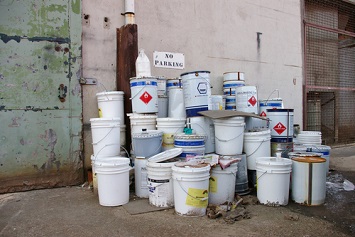“Is the waste my facility produces hazardous?” This is a question common to generators of wastes in all industries. The answer to this question is essential, as it’s at the heart of the Resource Conservation and Recovery Act (RCRA) regulations for handlers of hazardous waste. Generators as well as facility managers and/or owners of treatment, storage, and disposal facilities (TSDFs) cannot begin to comply with the myriad of RCRA hazardous waste regulations until they have taken the first step—properly identifying and characterizing the wastes that they generate, treat, store, or dispose of at their facility.
However, it seems as though many facility managers simply don’t know they need to, forget, or purposely overlook this question as the U.S. Environmental Protection Agency (EPA), and state regulatory agencies frequently and consistently hit companies with violations for “failure to make hazardous waste determinations.”
In the first half of this year, the EPA cited approximately 20 companies, large and small, for this violation. And, yes, each facility was hit with a federal penalty; they received penalties ranging from $15,000 to over $150,000. Granted, this wasn’t the only violation; other RCRA violations contributed to the total penalty amounts for non-compliant facilities. But, if you haven’t determined whether your facility’s waste is hazardous, then it’s not surprising that you also failed to follow the RCRA rules for storing, labeling, inspecting, manifesting, and disposing of hazardous waste, as well as the requirements for notifying agencies of your hazardous waste activities and developing required plans and reports.
How Do You Determine If Your Facility’s Waste Is Hazardous?
Is it a waste? To be considered a hazardous waste, a material first must be classified as a solid waste. Solid waste can be garbage, refuse, sludge, or other discarded material (including solids, semisolids, liquids, and contained gaseous materials).
Is it exempt? If a waste is deemed solid waste, the next step is to determine whether the RCRA rules specifically exclude the waste from regulation. If the waste does not match either a solid waste or hazardous waste exclusion as specified in 40 CFR 261.4, a further determination must be made as to whether the solid waste is hazardous waste.
Is it hazardous waste? The final step of the determination is accomplished by analyzing the waste and/or by applying knowledge of the waste and how it was generated. Waste analysis involves identifying and verifying the chemical and physical characteristics and composition of a waste by performing a detailed laboratory analysis of a representative waste sample. Alternatively, a facility may apply knowledge of the waste and the process that generated the waste to make the determination.
The waste is hazardous if:
- The waste analysis determines that the waste exhibits one of four hazardous characteristics—ignitability, corrosivity, reactivity, or toxicity—described in Subpart C of 40 CFR 261 (i.e., it is a “characteristic” hazardous waste); or
- Your knowledge of the waste allows you to determine that it is specifically named on one of four lists of hazardous wastes located in Subpart D of 40 CFR 261 (i.e., it is a “listed” hazardous waste).
Should you keep a record? As a waste generator or a facility manager at a waste generating facility, you should keep records to support your hazardous waste determinations, including records that show if a solid waste is a hazardous waste. Keep these records for 3 years from the date the waste was last sent for treatment, storage, or disposal. Information to include is found in the hazardous waste generator regulations.
After the Determination
A proper hazardous waste determination is needed to ensure that the waste is managed properly. If, after a hazardous waste determination has been made, the waste does not qualify as a hazardous waste, then the RCRA regulations do not apply. However, if the waste is deemed hazardous, then the RCRA rules come very much into play and your facility’s compliance obligations increase dramatically. So, make a hazardous waste determination in order to avoid costly violations and ensure the safe management of the hazardous waste.

